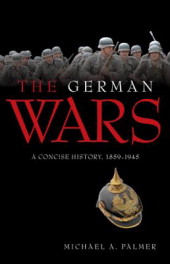This is not another book on the history of the German military. Instead, Michael A. Palmer’s excellent volume takes a wide-ranging approach looking at political, social, economic, and military developments across Europe, and the United States of the period. He outlines the history of the European political and military landscape. Between 1859 –1945 the German were engaged in the War of German Unification, Franco-Prussian War, World War I and World II. They won two of wars and lost two wars.
Dr. Palmer’s book is a small volume. Including indexes, it is only 248 pages. There is an amazing amount of information contained in this small space. While not a detailed tome, the author supplies enough information for you to get the general picture of a subject. For example, he surveys the reasons for World War II, including the role of the Treaty of Versailles and the Kellogg-Brand Pact but does not get bogged down in the finer points.
Dr. Palmer's book has a wonderful blend of scholarship and readability. He communicates the information in an interesting manner. I loved the sidebars he has throughout the book. They cover a variety of subjects relevant to the wars. They expand and explain various points. For example, he does an excellent job of explaining the strategic bombing in World War II. In February 1944, the around the clock bombing of the Eighth sand Fifteen Air Forces quickly ground down the Luftwaffe to their knees. Learning of the role the air war hard in reducing German production output by as much as forty percent amazed me.
Excellent critical thinking is demonstrated in the last chapter title “Conclusions”. The focus of the chapter is conclusions that can be drawn from the wars. He shows an innate error in the German plans for World War I and World War II. He shows how the leadership anticipated the wars quick conclusion. They failed to plan for a war that lasted more than a few weeks. For instance, German war production for World War II did not reach maximum efficiency until the war was several years along. Why? The Germans thought their prewar supplies would be sufficient for a short war.
The origination of the index at the book’s end is very helpful. First, there is traditional index. Next, battles, military units, organizations, people, places/geography, wars, and weapons organize the index. This makes it easy to locate information.
This is an excellent book - well done, Dr. Palmer. It is highly readable. It would be an excellent addition to the library of any military historian, public library, university library as well as personal collection of persons with interest in European or Trans-Atlantic History.



